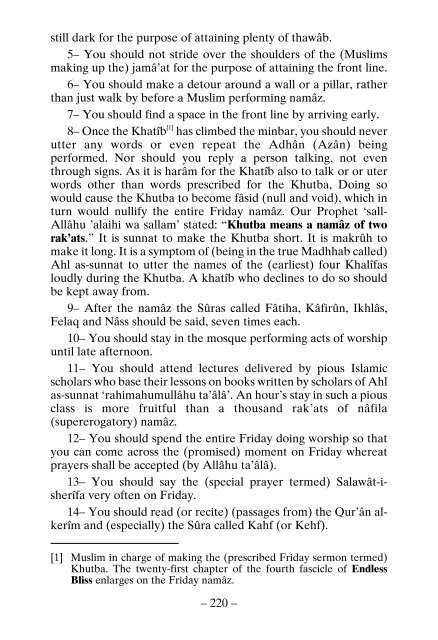O Son !
THE BOOK ‘O SON’ Al-hamdu lillâhi Rabbil ’âlamîn. Wa-s-salâtu wa-s-salâmu ’alâ Rasûlinâ Muhammadin wa Âlihi wa Sahbihi ajma’în. 1– O son! Collecting from books written by the scholars of the Hanafî Madhhab three hundred and sixty hadîth-i-sherîfs and forty-four khabars and also the seven essentials and the five rukns and the seven wâjibs and the fourteen sunnats and the twenty-five mustahabs and the fourteen mufsids of namâz, I have explained them for you. Adapt your acts and deeds to these teachings so that you attain fayz and nejât (salvation)! 2– Also for your information, I have collected a thousand and ninety âdâb (adabs) for you and for other young Muslims like you. If you adapt your actions and acts of worship to these teachings, they will be sufficient for you. If you laze, disobey Allâhu ta’âlâ and cease from these practices and manners, you will be afflicted with slavery and disgrace in the world and subjected to torment in the world to come. If you live up to them and advise your Muslim brothers to do the same, it will be useful for you. They will say blessings over you. And Haqq ta’âlâ will accept their invocations. For, a slave will be pardoned on account of another slave’s invocations for them.
THE BOOK ‘O SON’
Al-hamdu lillâhi Rabbil ’âlamîn. Wa-s-salâtu wa-s-salâmu ’alâ
Rasûlinâ Muhammadin wa Âlihi wa Sahbihi ajma’în.
1– O son! Collecting from books written by the scholars of the
Hanafî Madhhab three hundred and sixty hadîth-i-sherîfs and
forty-four khabars and also the seven essentials and the five rukns
and the seven wâjibs and the fourteen sunnats and the twenty-five
mustahabs and the fourteen mufsids of namâz, I have explained
them for you. Adapt your acts and deeds to these teachings so that
you attain fayz and nejât (salvation)!
2– Also for your information, I have collected a thousand and
ninety âdâb (adabs) for you and for other young Muslims like you.
If you adapt your actions and acts of worship to these teachings,
they will be sufficient for you. If you laze, disobey Allâhu ta’âlâ
and cease from these practices and manners, you will be afflicted
with slavery and disgrace in the world and subjected to torment in
the world to come.
If you live up to them and advise your Muslim brothers to do
the same, it will be useful for you. They will say blessings over you.
And Haqq ta’âlâ will accept their invocations. For, a slave will be
pardoned on account of another slave’s invocations for them.
You also want an ePaper? Increase the reach of your titles
YUMPU automatically turns print PDFs into web optimized ePapers that Google loves.
still dark for the purpose of attaining plenty of thawâb.<br />
5– You should not stride over the shoulders of the (Muslims<br />
making up the) jamâ’at for the purpose of attaining the front line.<br />
6– You should make a detour around a wall or a pillar, rather<br />
than just walk by before a Muslim performing namâz.<br />
7– You should find a space in the front line by arriving early.<br />
8– Once the Khatîb [1] has climbed the minbar, you should never<br />
utter any words or even repeat the Adhân (Azân) being<br />
performed. Nor should you reply a person talking, not even<br />
through signs. As it is harâm for the Khatîb also to talk or or uter<br />
words other than words prescribed for the Khutba, Doing so<br />
would cause the Khutba to become fâsid (null and void), which in<br />
turn would nullify the entire Friday namâz. Our Prophet ‘sall-<br />
Allâhu ’alaihi wa sallam’ stated: “Khutba means a namâz of two<br />
rak’ats.” It is sunnat to make the Khutba short. It is makrûh to<br />
make it long. It is a symptom of (being in the true Madhhab called)<br />
Ahl as-sunnat to utter the names of the (earliest) four Khalîfas<br />
loudly during the Khutba. A khatîb who declines to do so should<br />
be kept away from.<br />
9– After the namâz the Sûras called Fâtiha, Kâfirûn, Ikhlâs,<br />
Felaq and Nâss should be said, seven times each.<br />
10– You should stay in the mosque performing acts of worship<br />
until late afternoon.<br />
11– You should attend lectures delivered by pious Islamic<br />
scholars who base their lessons on books written by scholars of Ahl<br />
as-sunnat ‘rahimahumullâhu ta’âlâ’. An hour’s stay in such a pious<br />
class is more fruitful than a thousand rak’ats of nâfila<br />
(supererogatory) namâz.<br />
12– You should spend the entire Friday doing worship so that<br />
you can come across the (promised) moment on Friday whereat<br />
prayers shall be accepted (by Allâhu ta’âlâ).<br />
13– You should say the (special prayer termed) Salawât-isherîfa<br />
very often on Friday.<br />
14– You should read (or recite) (passages from) the Qur’ân alkerîm<br />
and (especially) the Sûra called Kahf (or Kehf).<br />
[1] Muslim in charge of making the (prescribed Friday sermon termed)<br />
Khutba. The twenty-first chapter of the fourth fascicle of Endless<br />
Bliss enlarges on the Friday namâz.<br />
– 220 –

















